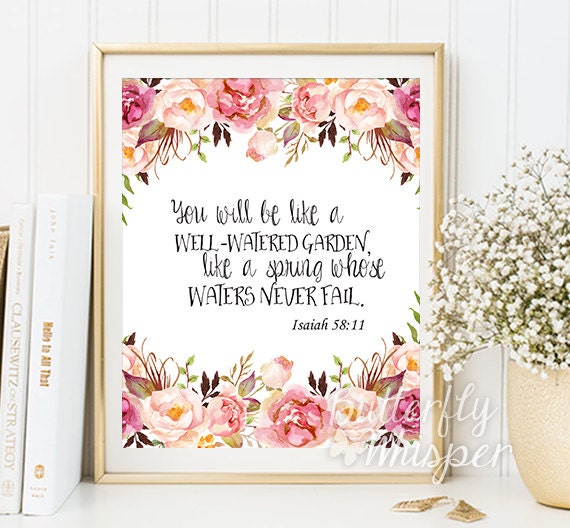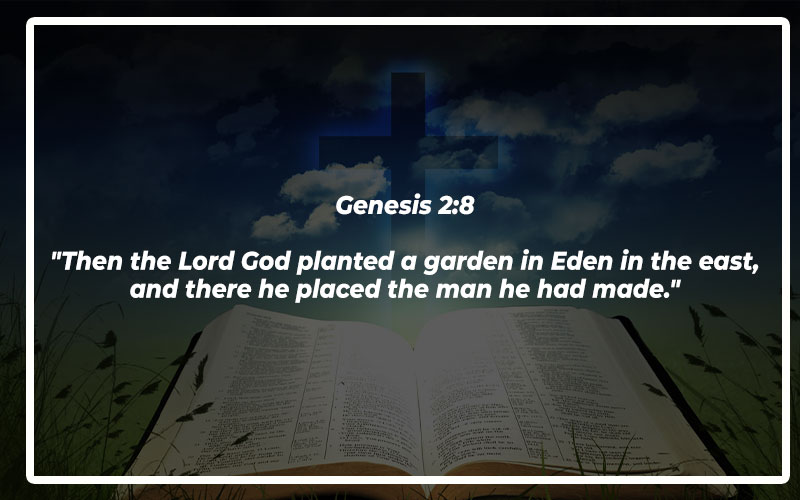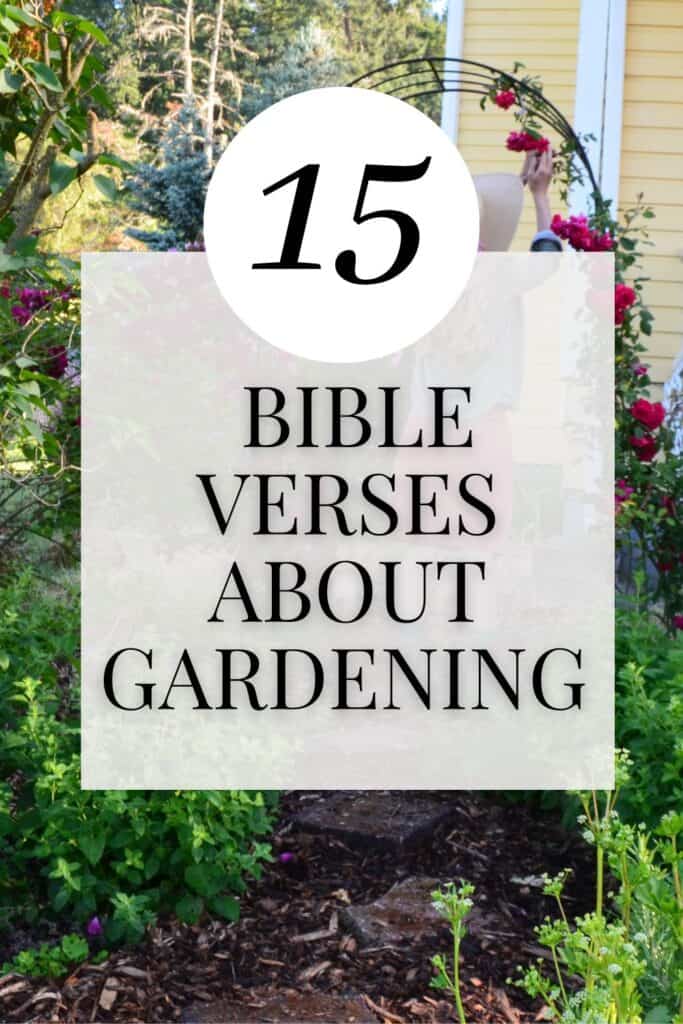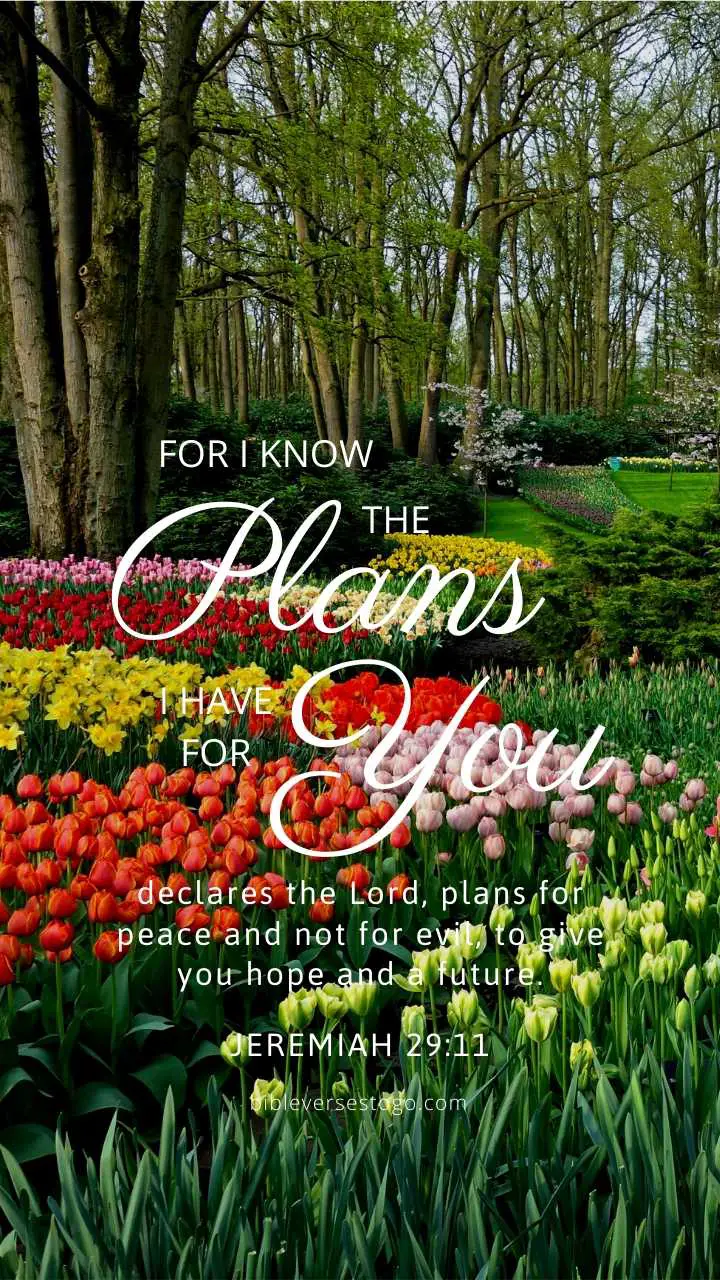Imagine stepping into a garden that not only pleases the senses but also nourishes the soul. Have you ever thought about how ancient wisdom can guide your green thumb?
Bible verses on gardening offer profound insights that resonate with both the heart and the earth. Whether you’re a seasoned gardener or just starting out, these divine words can inspire your planting journey. They remind you of the deep connection between faith and nature.
Curious to see how scripture can transform your garden into a sanctuary? Dive in and discover the spiritual seeds you can sow today.

Credit: www.etsy.com
JUMP TO TOPIC
Biblical Significance Of Gardens
Gardens hold deep biblical significance, symbolizing growth, life, and divine creation. Bible verses on gardening often reflect themes of nurturing faith and spiritual renewal. These sacred spaces serve as reminders of God’s presence and the abundance of His blessings.
Gardens hold a special place in the Bible, symbolizing growth, nourishment, and divine creation. They are where life begins, sustains, and flourishes. You might find parallels in your own garden, where you nurture plants and witness the miracle of life unfold. ###The Garden Of Eden: A Paradigm Of Perfection
The Garden of Eden is the first garden mentioned in the Bible. It’s portrayed as a paradise full of abundance and beauty. Imagine a place where everything grows effortlessly, and peace reigns. Have you ever felt that calm while tending your own garden? ###Gardens As Places Of Reflection And Renewal
Biblical gardens are often depicted as spaces for contemplation and renewal. Think about the Garden of Gethsemane, where Jesus prayed. Do you use your garden as a sanctuary to clear your mind or find solace? ###Gardens As Symbols Of Faith And Patience
Gardening requires faith and patience, much like the teachings in the Bible. You plant seeds, wait, and trust that they will grow. Have you noticed how your patience in gardening parallels your spiritual journey? ###Gardens As Sources Of Sustenance
The Bible highlights gardens as sources of physical nourishment. They provide food and herbs, essential for life. Consider how your garden supplies you with fresh produce. Isn’t it amazing how a small patch of earth can sustain you and your family? ###Gardens As Expressions Of Creativity
Creating a garden allows you to express your creativity, much like God’s creation of the world. You design, plant, and cultivate, bringing beauty to life. Have you found joy in crafting your garden, seeing it transform with each season? ###Gardens And Community
Gardens in the Bible often unite people, fostering community and shared labor. Think of how your garden can be a place for gathering and connecting with others. Do you invite friends or neighbors to share in the gardening experience, strengthening bonds through shared tasks? Gardens in the Bible are more than mere plots of land—they are profound symbols of life’s mysteries and joys. Reflect on your own garden’s significance. What lessons has it taught you?Gardening Metaphors In Scripture
Scripture often uses gardening metaphors to teach spiritual lessons. Bible verses about gardening highlight growth, nurturing, and faith. These metaphors inspire believers to cultivate their spiritual lives like a gardener tends to plants.
Gardening metaphors in the Bible offer deep spiritual insights. These metaphors connect nature with faith, growth, and divine abundance. They teach patience, trust, and hope. Through gardening, the Bible illustrates life’s spiritual journey.Seeds And Faith
Seeds symbolize the start of faith. A tiny seed grows into a strong plant. Just like faith starts small. With care and trust, it blossoms. The Bible compares this to spiritual growth. Even a mustard seed’s size can move mountains.Growth And Patience
Growth requires patience. Plants need time to mature. The Bible teaches us to wait and nurture our faith. Spiritual growth is slow but rewarding. Patience helps us endure hardships. It strengthens our character and spirit.Harvest And Abundance
The harvest represents God’s blessings. A fruitful harvest reflects spiritual abundance. The Bible shows that hard work and faith bring rewards. Abundance comes from cultivating good habits. It reminds us of God’s provision and care.Lessons From The Garden Of Eden
Biblical gardening offers wisdom from the Garden of Eden. Verses highlight patience, nurturing, and the beauty of growth. The Bible encourages cultivating both plants and spiritual virtues, reflecting harmony with nature.
The Garden of Eden, a cornerstone of biblical lore, offers profound lessons not just about faith, but also about nurturing and growth. As you tend to your garden, these ancient stories can provide insights into your daily life. Gardening is more than planting seeds; it’s about cultivating your mind and spirit, much like the first humans in Eden. Let’s dive into the teachings from this sacred garden and see how they resonate with your gardening journey. ###Creation And Stewardship
The Garden of Eden was designed with purpose and beauty. It’s a reminder that every garden starts with creation. When you plant, you’re not just placing seeds in the soil; you’re participating in a divine act. Consider the responsibility given to Adam and Eve to tend to the garden. They were stewards, entrusted with its care and growth. As you manage your garden, think of yourself as a caretaker of nature’s gifts. What does it mean to be a good steward? It might be as simple as choosing organic fertilizers or conserving water. You have the power to make choices that positively impact the environment. ###Temptation And Redemption
The story of Eden also speaks to the challenges of temptation. The serpent’s lure led to the first fall, but it also paved the way for redemption and understanding. Gardening can teach you about patience and resilience. When pests attack or plants fail to thrive, it’s easy to feel defeated. Yet, these setbacks offer a chance for learning and improvement. Think about the times you’ve faced challenges in your garden. How did you respond? Instead of seeing them as failures, view them as opportunities for growth. Your garden is a place where mistakes lead to wisdom. Embrace these moments as steps toward redemption, much like the lessons learned in Eden. As you reflect on these teachings, ask yourself: How do the stories of Eden shape your approach to gardening and life?
Credit: biblerepository.com
Parables Involving Gardens
Gardens in the Bible hold deep symbolic meanings. They often represent spiritual growth and the nurturing of faith. The parables involving gardens offer valuable lessons about life and spirituality. These stories use gardening metaphors to convey profound truths. Let’s explore some of these parables.
The Sower And The Seeds
The parable of the Sower and the Seeds is a well-known story. It illustrates how different hearts receive God’s word. A sower scatters seeds on various types of soil. Each type of soil represents a different response to the message. Some seeds fall on a path, quickly eaten by birds. Others land on rocky ground and fail to grow deep roots. There are seeds that fall among thorns, which choke them. But some seeds land on fertile soil and yield a bountiful harvest. This parable teaches about the importance of a receptive heart. It emphasizes the need for a strong foundation in faith.
The Mustard Seed
The Mustard Seed parable highlights the power of small beginnings. A tiny mustard seed grows into a large tree. This story symbolizes the Kingdom of God. It shows how something small can grow into something great. The mustard seed’s growth represents the spread of faith. Even the smallest act of faith can have a big impact. This parable encourages believers to trust in small beginnings.
The Vineyard Workers
The parable of the Vineyard Workers explores themes of fairness and generosity. A landowner hires workers at different times of the day. At the end of the day, all receive the same wage. Some workers feel this is unfair. The landowner explains his right to be generous. This story teaches about God’s grace and generosity. It highlights the idea that all are equal in God’s eyes. The vineyard symbolizes the world, and the workers represent believers. This parable reminds us of the importance of gratitude and humility.
Gardening As Spiritual Practice
Gardening can be more than a hobby. It nurtures the spirit and soul. Many find solace in tending to plants. The Bible offers wisdom for gardeners seeking spiritual growth. Verses in the Bible highlight the connection between nature and faith. This practice invites reflection on life’s deeper meanings.
Nurturing The Soul
Gardening brings serenity. It provides a chance to connect with creation. As you plant seeds, think about nurturing your soul. Each sprout reflects inner growth. The act of caring for plants mirrors caring for oneself. This practice offers spiritual renewal. The Bible encourages tending to the earth and one’s spirit.
Cultivating Patience And Perseverance
Gardening teaches patience. Seeds take time to grow. Watching them transform reminds us to wait. Perseverance is key. The Bible speaks of patience as a virtue. Tending a garden mirrors life’s journey. It requires dedication and faith. Waiting for blooms mirrors waiting for life’s blessings. This practice builds resilience.
Finding Peace And Reflection
Gardening brings peace. It offers a quiet space for reflection. Digging in the soil calms the mind. The Bible suggests finding peace in nature. As you garden, meditate on life’s mysteries. This tranquil practice grounds you. Reflecting in the garden fosters inner harmony. The beauty of nature inspires gratitude.

Credit: hilltopinthevalley.com
Nature And Divine Connection
Gardening offers a deep connection between humans and nature. This connection reflects divine teachings found in the Bible. By tending to the earth, we mimic the Creator’s nurturing hand. Biblical references to gardening illustrate this spiritual bond. These verses remind us of our role as caretakers. They also highlight the beauty and peace found in nature. Exploring these verses can enrich our understanding of this sacred relationship.
Genesis: The Beginning Of Creation
The Bible begins with the story of creation. Genesis describes God planting the Garden of Eden. This garden symbolizes paradise, abundance, and divine order. It serves as a reminder of God’s provision. It also reflects the harmony intended for creation. This story encourages us to respect and care for the earth.
Psalms: Nature’s Praise To God
The Book of Psalms celebrates nature’s beauty. It often uses gardens and plants as metaphors. These verses express gratitude for God’s creation. They inspire us to find joy in nature’s wonders. The Psalms remind us that all creation sings praises to God. This connection deepens our appreciation for the natural world.
Proverbs: Wisdom From The Garden
Proverbs often uses garden imagery to convey wisdom. It speaks of diligence, patience, and growth. These lessons mirror the gardener’s journey. Tending a garden requires dedication and care. Proverbs teaches us to apply these values to life. By doing so, we cultivate wisdom and understanding.
New Testament: Parables Of Growth
Jesus used gardening imagery in His teachings. He often spoke of seeds, plants, and harvests. These parables illustrate spiritual truths. They teach about growth, faith, and perseverance. The parable of the sower is a prime example. It shows the importance of nurturing faith for a fruitful life.
Revelation: The Garden Restored
The Book of Revelation offers hope for restoration. It describes a new heaven and earth. Within this vision, a restored garden appears. This symbolizes a return to divine harmony. It represents the ultimate connection with God. Revelation assures us of a hopeful future for all creation.
Applying Biblical Gardening Insights Today
Gardening holds profound wisdom found in biblical teachings. These ancient texts offer lessons that resonate today. They provide guidance in cultivating not just the land, but community and stewardship. Integrating these insights can enrich our modern gardening practices.
Community Gardening And Fellowship
Biblical teachings often emphasize community and togetherness. Gardens can become a place for fellowship. Neighbors can come together, exchanging ideas and sharing resources. This strengthens community bonds and fosters a sense of belonging.
In the Bible, gardens are depicted as places of gathering. They serve as settings for sharing and teaching. Community gardens today can mirror this tradition. They can be places of learning and social interaction. This aligns with the biblical vision of gardens as communal spaces.
Environmental Stewardship
The Bible encourages caring for the Earth. This principle is vital in gardening. Sustainable practices protect the land for future generations. Composting, conserving water, and planting native species align with these teachings.
Environmental stewardship in gardening reflects respect for creation. It reminds us of our role as caretakers of the Earth. This responsibility is echoed in many biblical passages. By embracing these practices, we honor this ancient wisdom.
Frequently Asked Questions
What Bible Verse Talks About Gardening?
Genesis 2:15 discusses gardening. It states, “The Lord God took the man and put him in the Garden of Eden to work it and take care of it. ” This verse highlights the importance of tending to gardens, symbolizing stewardship and care for nature.
Where In The Bible Does It Say That God Is The Gardener?
God is referred to as the gardener in John 15:1, where Jesus says, “I am the true vine, and my Father is the gardener. ” This metaphor highlights God’s nurturing and caring role. It illustrates His active involvement in spiritual growth.
Does God Want Us To Garden?
Many believe God encourages gardening as a way to nurture creation and connect with nature. The Bible often references gardens, like the Garden of Eden, promoting stewardship of the Earth. Gardening reflects care, responsibility, and growth, aligning with spiritual teachings about tending to the world.
What Does The Bible Say About Growing Plants?
The Bible mentions plants in Genesis, advising humans to cultivate the earth. Proverbs praises hard work and care in gardening. Jesus used plant growth in parables, emphasizing spiritual growth. Growing plants reflects biblical themes of stewardship and nurturing life.
Conclusion
Gardening reflects the beauty of creation and spiritual growth. Each Bible verse offers wisdom for nurturing nature and our souls. Embrace patience and care in your garden journey. Like plants, faith needs nurturing to flourish. Enjoy the peace and satisfaction gardening brings.
Let these verses inspire your gardening practices. Explore nature’s wonders and deepen your spiritual connection. Grow with love and purpose, just as these scriptures teach. Your garden can become a peaceful sanctuary. Connect with the divine through the nurturing of life.
Experience tranquility in every bloom and leaf.

